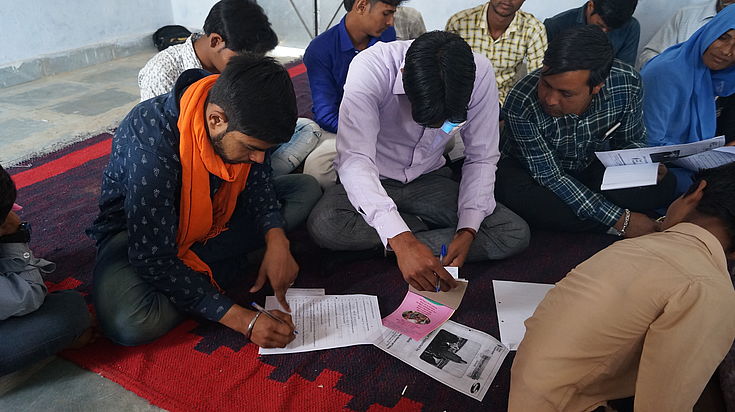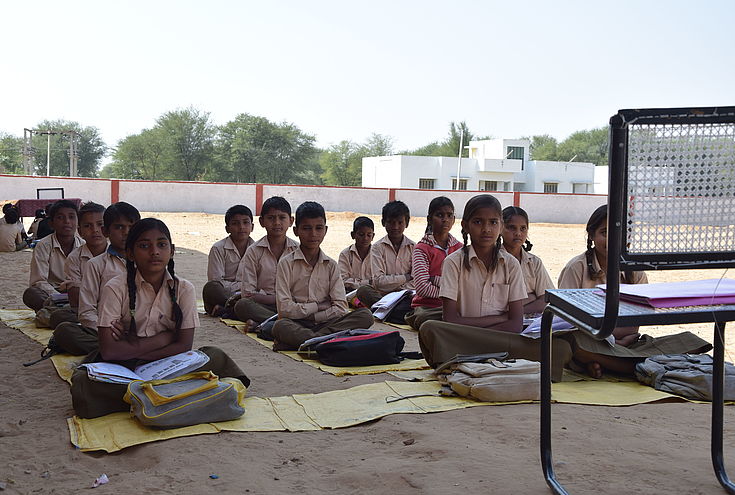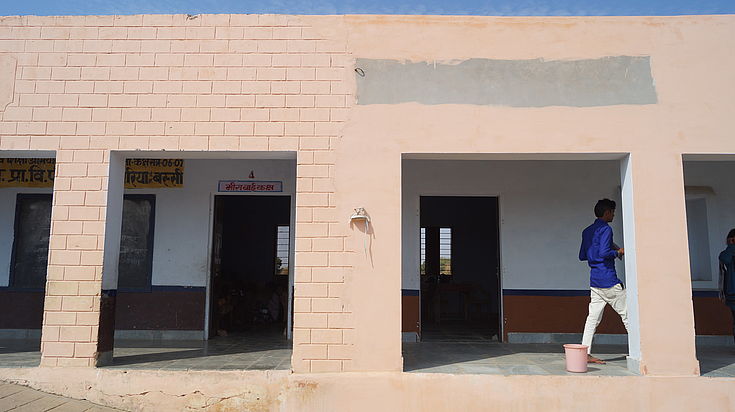SIDART strengthens federal structures of Sambhariya panchayat
Creating Gram Swaraj in Rajasthan
Despite federal tradition anchored in the constitution, the goals of democratic decentralization or “Gram Swaraj” of the 600,000 villages in India are far from achieved. To build capacities on the ground and thereby strengthening the bottom-up approach in the local federal structures, Hanns Seidel Foundation (HSF) India hand in hand with Society for Integrated Developmental Activities Research and Training (SIDART) develop a fully functioning model panchayat in rural Rajasthan until 2020. Hereby, HSF and SIDART can draw upon their vast experience gained through cooperating in the state since 2007. The focus remains on strengthening the political participation of women on the village-level, which is oftentimes not given in the patriarchic society.

Sambhariya representatives fill in a survey
The three-year project, which is funded by the German Federal Ministry for Economic Cooperation and Development, takes place in Sambhariya, a panchayat near the state’s capital Jaipur. In order to understand the issues and get to know the status of panchayats in all departments, first a baseline survey with a representative sample was conducted. Households, representative groups (such as Self-Help Groups, youth, women, farmers) as well as political representatives were interviewed on the most important devolved functions: education, nutrition, social aspects, household economy and infrastructure, The quantitative study was accompanied by qualitative interviews and surveys by the SIDART staff. At the end of 2020, a follow-up study will determine the progress of the panchayat during the three years.
The following are some of the conclusions which SIDART drew from the baseline study:
- There is a scarcity of power supply and fewer irrigation facilities.
- The role of the panchayat needs to be strengthened and the participation of the community needs to be enhanced.
- Villagers are prone to diseases like cholera, jaundice, typhoid and other water-borne diseases due to the unhygienic conditions.
- The availability and accessibility of the doctors and medical services under the public health scheme are very low.
- Bad or missing equipment and facilities at schools has a negative effect on primary education
The findings were shared with the panchayat representatives and a National Advisory Committee meeting (yearly meeting organized by SIDART) was held with various experts from Government & Non-Government Organizations as well as the elected representatives and village volunteers from Sambhariya and various other villages who have been associated with SIDART for a long time.
Based upon the analysis of the study, several awareness and training programs, campaigns, exposures and learning visits are organized with the aim of minimizing the issues and problems faced by the village. A major concern is the sustainability of the model panchayat post-intervention, which is addressed amongst others through training village volunteers. The ongoing activities have shown a number of effects on the panchayat and its people.

2018: A lesson takes place in the courtyard
On 1st of March, a small HSF team traveled to Sambhariya to get an impression of the ongoing project and to take part in one of the trainings (devolution of powers to panchayat), which were tailored to address the identified gaps in the baseline survey. One of the gaps identified was primary education in the government schools – a crucial area of intervention that should involve the parents of the students and the representative’s village groups. Under the guidance and leadership of Dr. Pramila Sanjaya, project head of SIDART, 40 participants including the sarpanch (elected head of the panchayat) developed a list of questions in small working groups and conversed on the necessity of the involvement of aforesaid group in the administration of the school and providing them with the knowledge and support from their end as well as from the panchayat’s end. To put their ideas into action, the groups directly approached the local primary school with their ideas.

2019: The school has been enlarged with one extra classroom
Through independent interviews with students, teachers and the principal, ideas could be further developed. The principal proudly guided the group through the five classrooms, including a room newly built as a direct result of the survey findings. Previously, the class had to sit in the courtyard during school hours, often exposed to heat. The development was attributed to the efforts undertaken by the sarpanch. The workshop revealed a high degree of ownership and initiative by the inhabitants of Sambhariya who are willing to make the best possible of their panchayat. By 2020, a follow-up study will reveal the degree of actual and perceived improvement of devolution, citizen participation, health, nutrition, education and economic livelihoods of Sambhariya.
